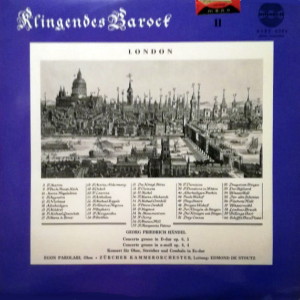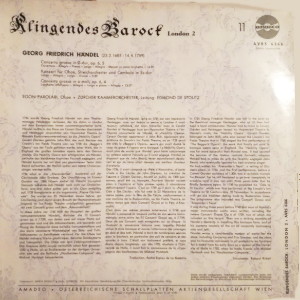 |
1 LP -
Amadeo AVRS 6366
|
 |
|
| LONDON -
Klingendes Barock - 11 |
|
|
|
|
|
|
|
| Georg Friedrich
Händel (28.2.1685 - 14.4.1759) |
|
|
|
| Concerto Grosso
in D-dur, Op.6, 5 |
|
16' 52" |
A1 |
| - Ouverture ·
Allegro · Presto · Largo · Allegro
· Menuet/un poco larghettino |
|
|
|
| Konzert für
Solo-Oboe, Streichorchester und
Cembalo in Es-dur |
|
9' 30" |
|
| -
Largo · Allegro |
4' 00" |
|
A2 |
| -
Largo · Vivace |
5' 30" |
|
B1 |
| Concerto Grosso
in a-moll, Op.6, 4 |
|
|
|
| - Larghetto
affettuoso · Allegro · Largo e
piano · Allegro |
|
13' 25"
|
B2 |
|
|
|
|
| Egon
Parolari, Oboe |
|
ZÜRCHER
KAMMERORCHESTER / Edmond de
Stoutz, Leitung
|
|
|
|
|
|
Luogo
e data di registrazione |
|
- |
|
|
Registrazione:
live / studio |
|
studio |
|
|
Edizione LP |
|
AMADEO
- AVRS 6366 - (1 lp) - durata 39'
47" - (p) 1966 - Analogico |
|
|
Altre edizioni
LP
|
|
MACE
- MCS9063 - (1 lp) |
|
|
Prima Edizione
CD |
|
- |
|
|
Note |
|
Stereo
compatibile
|
|
|
|
|
In 1724
Georg Friedrich
Handel was left in
the lurch by
theorical manager
Heidegger, who up
till then had been
a layal
collaborator
Handel had to move
to Covent Garden
and Heidegger
leased his
Haymarket Theatre
to belonged to
John Rich, who
also owned the
Lincoln's Inn
Field Theatre that
in 1728 staged the
first performance
of "The Beggar's
Opera", the work
that finally put
paid to baroque
opera seria in
England. The
"Nobility Opera"
was for more
successful than
Handesl was. It
had secured the
services of the
famous castrato
Farinelli, whereas
Handel had to make
do with the
recently engaged
John Beard, who
eventually became
his best oratorio
singer.
He
had written his
"Alexander's
Feast", a
setting of
Dryden's poem,
in 1736, and the
first
performance,
before a Covent
Garden audience
of 1.300, was a
veritable
triumph for
Handel. Yet he
still hesitated
to go over
completely to
oratorio, and it
was not until
three years
later that he
finallyforswore
opera. In 1739
he produced his
"Ode to St
Cecilia" which
was forst
performed at
the Lincoln's
Inn Theatre on
St Cecilia's
day, 22
November, in
accordance
with an old
tradition
dating back to
Restoration times.
The programme
also included
two Concerti
Grossi and
"Alexander's
Feast".
It
was during
these years
before 1740
that most of
Handel's major
instrumental
works were
written,
including the
twelwe
Concerti
Grossi Op 6 of
1739, two of
which are
included on
this record.
They are a
striking
example of
Handel's
dexterity in
handling this
baroque form,
and of his
supreme
mastery of the
art of
conjointly
contrasting
solo and
tutti.
Handel
wrote a
considerable
number of
works for the
oboe,
including
Concertos and
Trio Sonatas,
and the oboe
was his
favourite
instrument. In
all
probability
his fondness
for hit dated
from his early
days as a
student at the
Univeristy of
Halle in 1702,
when he made
friends with
Michael
Hyntzsch and
his
"Hautboisten-Companie".
Alfons
Übelhör
(Translation:
Richard
Rickett)
|
|

